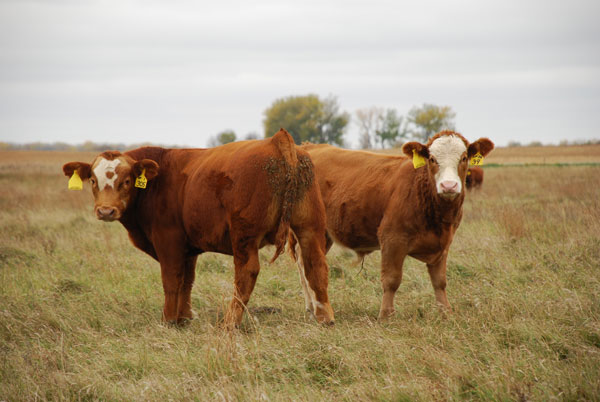When is the best time to castrate bull calves?
Research shows time and time again, whether it is because of profit or pain management, that the earlier you castrate, the better.
January 9, 2019

A Kansas State University study showed that bulls castrated and implanted at an average of 3 months of age weighed 2 pounds more at 7.5 months of age than did the intact bull calves in the same study. At 7.5 months, the bulls were castrated, and then both groups were weighed 28 days later to assess gain.
The steers castrated as calves gained 48 pounds, while the bulls that were cut at an average of 578 pounds only gained 33 pounds. That is a lost potential gain of 15 pounds, as these late-castrated bulls had to deal with the stress of healing from surgery.
The fallacy is that there is a positive “testosterone effect” that justifies not castrating until bulls weigh 500 pounds or more. This is a myth. When bull calves were blood-tested to measure testosterone levels, significantly high levels did not occur until 8 to 9 months of age. Studies show that bulls castrated at over 500 pounds will lose weight for two weeks after castration. How can that be beneficial?
While there are many reasons to be in the cattle business, two that generally lead the list are to provide the best care for the animals and to have a successful, profitable business. Castrating calves late accomplishes neither of these goals.
In five studies that examined weight at weaning, bulls averaged only 7 pounds higher than steers that were cut early (< 3 months). Studies also show the average gain from implanting the suckling calf with a low-dose implant is 18 to 24 pounds. You can add the weight with none of the stress with a suckling calf implant.
These are the Beef Quality Assurance guidelines on castration: “All bulls that are not herd-sire prospects should be castrated as early in life as possible. Early castration is less stressful on bull calves. Preferably, castration should occur between birth and 4 months of age.”
American Veterinary Medical Association policy on castration and dehorning: “Both dehorning and castration should be done at the earliest age practicable.”
This is the science of when to castrate. Our leading advisers all recommend castrating early.
As a cow-calf producer, don’t we want the stocker-backgrounder and feedlot owners to make a very healthy profit on our calves? The more profit made up the supply chain, the more money they have to buy again next year. Every business transaction needs to be win-win or that relationship won’t last.
What are additional reasons to castrate early? Improved health for the calf as he moves to the next segment of the industry, increased price per cwt for steers vs. bulls, improved gain and feed efficiency, increased carcass marbling and quality, and improved carcass tenderness. The reasons to castrate late are as follows: none.
On the health side, KSU has kept data on 2,762 head of high-risk steers and bulls that it has purchased for its stocker research trials. The steers have had a 0.72% death loss, while the bulls that were castrated at the yard had a 2.28% death loss. On a 1,000-head basis, that is a loss of seven steers and 23 bulls — over a 3x increase in death loss. If you are a cow-calf producer selling feeder bulls, this number should make you wince. I know it does me.
Dave Daley, administrator of the Ag Education and Research Center at California State University, Chico, spoke at an National Cattlemen’s Beef Association meeting a few years ago and said we need to stop saying things like, “I take good care of my animals because it is profitable.” That doesn’t resonate with the public.
He suggested a more heartfelt answer: “I take great care of my animals because it’s the right thing to do. I love working with livestock and caring for them regardless of the conditions — season, weather or time of day.” Many times, we do profit from “doing the right thing,” and castrating early is one of those “right things” that also raises our profit.
Hilton, DVM, PAS, DABVP (beef cattle) is clinical professor emeritus, Purdue University College of Veterinary Medicine; and a senior technical veterinary consultant, Elanco Animal Health.
About the Author(s)
You May Also Like





